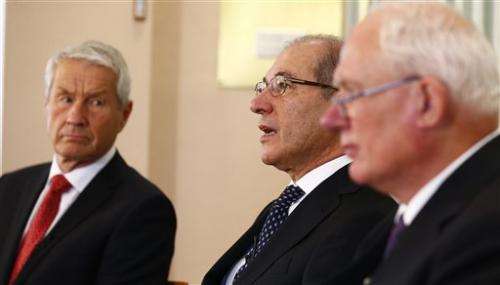Your guide to the 2013 Nobel Prizes

The winners of the 2013 Nobel Prizes will collect their $1.2 million awards Tuesday at ceremonies in Stockholm and Oslo. Here's a look at the laureates and their achievements:
ECONOMICS
Three Americans were honored for developing new methods to study trends in asset markets, showing that it is difficult to predict whether stock or bond prices will go up or down in the short term, but over periods of three years or more it is possible. The winners are Eugene Fama and Lars Peter Hansen of the University of Chicago and Robert Shiller of Yale University. Fama studied the short-term prices, Shiller looked at the predictability in the long run and Hansen developed a statistical method to test theories of asset pricing.
NOBEL PEACE PRIZE
The Organization for the Prohibition of Chemical Weapons, the investigation and enforcement arm for a 1997 treaty banning the use of chemical weapons. Based in The Hague, Netherlands, the global chemical weapons watchdog deploys teams worldwide to identify whether all 190 nations that have signed the treaty are disclosing all chemical weapons stocks and, if possessing them, destroying both the weapons and their manufacturing sites. An OPCW mission is currently overseeing the destruction of chemical weapons stockpiles and facilities in Syria.
NOBEL PRIZE IN LITERATURE
Canadian author Alice Munro, hailed by the award-giving Swedish Academy as a "master of the contemporary short story." Known as "Canada's Chekhov" for her astute, unflinching and compassionate depiction of seemingly unremarkable lives. She produced several story collections chronicling the lives of girls and women before and after the 1960s social revolution, including "The Moons of Jupiter," ''The Progress of Love" and "Runaway." Munro, 82, was too frail to travel to Stockholm, so her daughter, Jenny Munro, is representing her at the ceremony.
NOBEL PRIZE IN CHEMISTRY
Three U.S.-based scientists for developing computer models that can predict chemical reactions for use in creating new drugs and other tasks. Their approach combined classical physics and quantum physics. The winners are Martin Karplus of the University of Strasbourg, France, and Harvard University; Michael Levitt of the Stanford University School of Medicine, and Arieh Warshel of the University of Southern California in Los Angeles.
NOBEL PRIZE IN PHYSICS
Peter Higgs of Britain and Francois Englert of Belgium for their 1964 theory, advanced independently of each other, about how subatomic particles get their mass. Their theory made headlines last year when the CERN laboratory in Geneva confirmed it by discovering the so-called Higgs particle.
NOBEL PRIZE IN MEDICINE
Three U.S.-based researchers for their breakthroughs in understanding how key substances move within a cell. They developed better understanding of vesicles, tiny bubbles that deliver their cargo within a cell to the right place at the right time. Disturbances in that delivery system can lead to neurological diseases, diabetes or immunological disorders. The prize was shared by Americans James E. Rothman of Yale University and Randy W. Schekman of the University of California at Berkeley; and German-American Dr. Thomas C. Sudhof of the Stanford University School of Medicine.
© 2013 The Associated Press. All rights reserved.




















